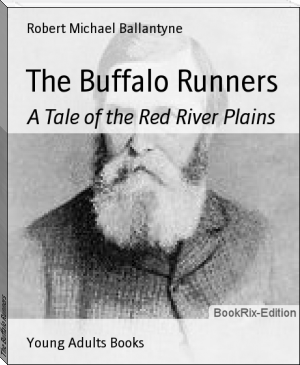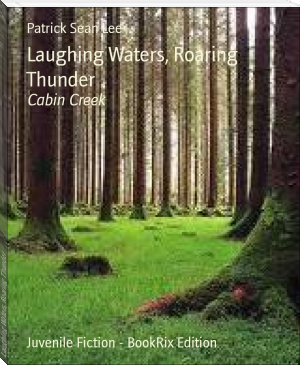The Buffalo Runners, Robert Michael Ballantyne [best fiction novels of all time .txt] 📗

- Author: Robert Michael Ballantyne
Book online «The Buffalo Runners, Robert Michael Ballantyne [best fiction novels of all time .txt] 📗». Author Robert Michael Ballantyne
As it was, when the Hudson's Bay party drew near they thought the look of their opponents so suspicious that the Governor halted his men, and they stood in a group as if in consultation. Seeing this, the half-breeds divided themselves into two bodies, and commenced firing from behind some willows--at first a shot or two, and then a merciless volley. No fewer than twenty-one of the twenty-eight fell to rise no more, among whom were the Governor himself; Mr Wilkinson, his secretary: Captain Rogers, a mineralogist; Mr White, the surgeon; Mr Holt, of the Swedish navy, and Mr McLean, a principal settler.
Indeed the whole party would have probably been killed and the settlers massacred at that time, but for the courageous interposition of the chief of the half-breeds, Cuthbert Grant, who, at the risk of his life, stood between the settlers and their foes, only one of which last was killed.
When old McKay and his party drew near to the scene, the massacre was completed, and most of his little band--which had been slightly augmented on the way up--turned right-about, and rode away to defend their respective homes.
But the warrior spirit of old McKay and his sons had been roused. They refused to turn tail, and, in company with Dan and Peter Davidson, made a furious charge into a detached party of the half-breeds which they chanced to encounter. They scattered them like sheep, though they did not succeed in killing any. Then they also wheeled round and galloped back to their respective homes.
"Come, Elspie, tear," said the old man as he dismounted, "putt what ye value most in your pocket an' come away. The duvles are down on us, and we are not able to hold out in Ben Nevis. The settlers must choin altogether, an' do the best we can to defend ourselves."
While he was speaking, the Highlander was busy stuffing some of the smaller of his household goods into his pockets--amongst them a large quantity of tobacco.
Meanwhile Fergus hastened to the stable to saddle Vixen for Elspie, while the poor girl ran to her room and secured some small objects which she valued--among them a miniature portrait of her mother, and a Bible which the good lady had given to her a short time before her death. There was no money, and no valuable documents had to be looked after, so that preparations for fight were soon completed.
Now there was a member of old Duncan McKay's household who has not yet been introduced to the reader, but whose character and influence in the household were such as to demand special notice. This member was an old woman named Peg. Probably this was an abbreviation of Peggy, but we cannot tell. Neither can we say what her surname was, for we never heard it, and no one spoke of the old creature by any other name than that of "Old Peg."
Although Old Peg was by no means feeble--indeed, judged by her capacities, she might have been pronounced middle-aged, for she could walk about the house all day, actively engaged in miscellaneous self-imposed duties, and could also eat like a man and sleep like a dormouse--she was, nevertheless, withered, and wrinkled, and grey, and small. Her exact age nobody knew--and, for the matter of that, nobody seemed to care.
Extreme amiability and self-obliteration were the chief characteristics of Old Peg. She was silent by nature, and deaf as a post--whether by art or nature we know not; probably both. Well, no--on second thoughts, not quite as deaf as a post, for by means of severe shouting she could be made to hear.
Smiles and nods, however, were her chief means of communication with the outer world. When these failed, a yell might be tried with advantage.
No one of the McKay household ever thought of giving Old Peg anything in the shape of work to do, for the very good reason that, being an extremely willing horse, she was always working; and she possessed a peculiar faculty of observation, which enabled her to perceive, long before any one else, what ought to be done, and the right time to do it, so that, when any one bounced round with the sudden intention of telling her to do anything, Old Peg was found to have done it already, or to be in the act of doing it. It is almost superfluous to say that she patched and mended the household garments, washed the most of things washable, sewed the sewable, darned the sock, and, generally, did-up the whole McKay family. When not engaged in definite or specific work, she had a chronic sock-knitting which helped to fill up and round off the corners of her leisure hours.
Old Peg had been the nurse, consecutively, of Fergus, Elspie, and Duncan junior. She was now equivalent to their second mother, having nursed their first mother to the end with faithful untiring affection, and received from the dying woman a solemn commission never to forsake Duncan senior or his progeny.
No sentiment of a religious nature ever escaped Old Peg, but it was observed that she read her Bible regularly, and was occasionally found asleep on her knees--greatly to the amusement of that irritable old rascal, Duncan senior, and to the gratification of Elspie, who came to the conclusion that the old woman must have learned well off by heart such words as--"Whatsoever thy hand findeth to do; do it with thy might." "Do good to all men as thy hand findeth opportunity." "Be clothed with humility." "Trust in the Lord at all times." Probably Elspie was right, for she judged of people in the old-fashioned way, namely, "by their fruits." Her judgment of the two Duncans on this principle, by the way, could not have been very exalted, but we cannot tell. She was much too loyal and loving a daughter and sister to give any sign or opinion.
At the time of the sudden call to flight just described, the McKay family had totally forgotten Old Peg in their hurry. Elspie was the first to miss her.
"Old Peg!" she exclaimed--almost screamed--while Fergus was assisting her to mount Vixen, "where is she?"
"I'll find her," said Fergus, "and bring her on in the cart. You be off after father. We've no time to lose."
"Be _sure_ you bring her, Fergus," said Elspie.
"All right; no fear!"
Thus assured, Elspie was about to gallop away after her father--who had started in advance, to overtake and stop the Prairie Cottage family, so that they might travel in one band--when the clatter of hoofs was heard, and next moment Dan Davidson galloped round the corner of the house.
"I came back for you, Elspie," he said, pulling up. "Why did you not come on with your father?"
"I expected to overtake him, Dan. You know Vixen is swift. Besides, I missed Old Peg, and delayed a few minutes on her account. Is she with your party?"
"No--at least I did not see her. But she may have been in the cart with Louise. Shall I look for her while you gallop on?"
"No; Fergus has promised to find and bring her after us. Come, I am ready."
The two galloped away. As they did so young Duncan issued from the stable behind the house, leading out his horse. He was in no hurry, having a good mount. At the same time Fergus came out at the back-door of the house shouting, "Old Peg! Hallo! old woman, where are ye?"
"Hev ye seen her, Duncan?" he asked impatiently.
"It iss seekin' high an' low I hev been, an' it iss of no use shoutin', for she hears nothin'."
"I'm sure I saw her in the cart wi' the Davidsons," said Duncan.
"Are you sure?" asked Fergus.
"Weel, I did not pass quite close to them, as I ran up here for my horse on hearin' the news," replied Duncan; "but I am pretty sure that I saw her sittin' beside Louise."
"Hm! that accoonts for her not being here," said Fergus, running into the stable. "Hold on a bit, Duncan. I'll go with ye in a meenit."
In the circumstances he was not long about saddling his horse. A few minutes more, and the brothers were galloping after their friends, who had got a considerable distance in advance of them by that time, and they did not overtake them till a part of the Settlement was reached where a strong muster of the settlers was taking place, and where it was resolved to make a stand and face the foe.
Here it was discovered, to the consternation of the McKay family, that Old Peg was not with the Davidson party, and that therefore she must have been left behind!
"She _must_ be found and rescued," exclaimed Elspie, on making the discovery.
"She _must_!" echoed Dan Davidson: "who will go back with me?"
A dozen stout young fellows at once rode to the front, and old McKay offered to take command of them, but was overruled and left behind.
CHAPTER NINE.
OLD PEG.
Meanwhile, accustomed to think and act for herself, Old Peg, on the first alarm, had made up her mind to do her fair share of work quietly.
She did not require to be told that danger threatened the family and that flight had been resolved on. A shout from some one that Nor'-Westers were coming, coupled with the hasty preparations, might have enlightened a mind much less intelligent than that of the old woman. She knew that she could do nothing to help where smart bodily exercise was needed, but, down by the creek close by, there was a small stable in which a sedate, lumbering old cart-horse dwelt. The horse, she felt sure, would be wanted. She could not harness it, but she could put a bridle on it and lead it up to the house.
This animal, which was named Elephant on account of its size, had been totally forgotten by the family in the hurry of departure.
Old Peg found the putting of a bridle on the huge creature more difficult work than she had expected, and only succeeded at last by dint of perseverance, standing on three or four bundles of hay, and much coaxing--for the creature had evidently taken it into its head that the old woman had come there to fondle it--perhaps to feed it with sugar after the manner of Elspie.
She managed the thing at last, however, and led the horse up towards the house.
Now, while she had been thus engaged the family had left, and the half-breeds--having combined their forces--had arrived.
Ben Nevis was the first house the scoundrels came to. Dismounting, and finding the place deserted, they helped themselves to whatever was attractive and





Comments (0)